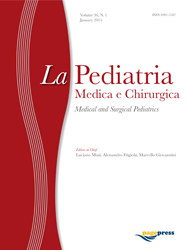Short Communications
Vol. 39 No. 2 (2017)
Primary monosymptomatic nocturnal enuresis and associated factors in a referral continence clinic of Abu Dhabi

Publisher's note
All claims expressed in this article are solely those of the authors and do not necessarily represent those of their affiliated organizations, or those of the publisher, the editors and the reviewers. Any product that may be evaluated in this article or claim that may be made by its manufacturer is not guaranteed or endorsed by the publisher.
All claims expressed in this article are solely those of the authors and do not necessarily represent those of their affiliated organizations, or those of the publisher, the editors and the reviewers. Any product that may be evaluated in this article or claim that may be made by its manufacturer is not guaranteed or endorsed by the publisher.
Received: 20 February 2017
Accepted: 21 February 2017
Accepted: 21 February 2017
2363
Views
972
Downloads
209
HTML






